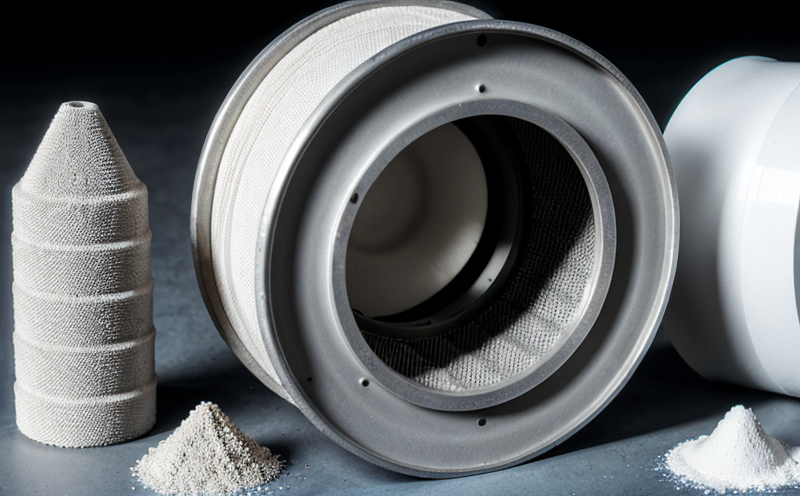IMO IGC Code Certification Testing of LNG/LPG Containment Systems
The International Maritime Organization's (IMO) International Gas Carrier (IGC) Code is a critical regulatory document that governs the design, construction, and operation of gas carriers. Compliance with this code ensures safe transportation and storage of liquefied natural gas (LNG) and liquefied petroleum gas (LPG). Eurolab offers comprehensive testing services to ensure compliance with the IGC Code for LNG/LPG containment systems.
Our state-of-the-art facilities are equipped with advanced instrumentation capable of simulating various environmental conditions that these systems may encounter during transportation. This includes extreme temperatures, pressure variations, and dynamic loading scenarios. We employ rigorous testing protocols to evaluate the mechanical integrity, structural strength, and sealing capabilities of containment systems under these challenging conditions.
For additive manufacturing materials used in LNG/LPG containment systems, we conduct detailed characterization tests that assess properties such as tensile strength, elongation at break, impact resistance, and fatigue life. These tests are crucial for ensuring the reliability and safety of additive manufactured parts, which often possess unique microstructures compared to conventionally processed materials.
The testing process begins with thorough inspection and evaluation of raw material batches before any manufacturing takes place. This ensures that only high-quality materials are used in production. During manufacturing, we closely monitor the process parameters to maintain consistent quality throughout each part. After fabrication, extensive non-destructive testing (NDT) methods like ultrasonic testing, radiographic examination, and magnetic particle inspection are employed to detect potential defects within the parts.
Once fabricated components have passed NDT inspections, they undergo further mechanical property evaluations using specialized equipment such as tensile testers, hardness meters, and wear testers. These tests provide quantitative data about key material properties which are then compared against specified acceptance criteria outlined in relevant international standards like ISO 13679 for additive manufacturing processes.
Additionally, full-scale system testing is conducted to replicate real-world operational conditions. This includes pressure testing at varying levels up to design pressures specified by the IGC Code, ensuring that containment systems can withstand expected stresses without failure. Furthermore, leak detection tests are performed using tracer gas methods or vacuum box techniques to identify any potential leaks in the system.
The combination of these comprehensive evaluation procedures guarantees that every aspect of an LNG/LPG containment system is thoroughly examined and validated against stringent regulatory requirements. By adhering strictly to IGC Code guidelines, we ensure safe and reliable transport solutions for both producers and consumers worldwide. Our commitment to excellence ensures that clients receive accurate results backed by robust documentation necessary for successful certification.
- Thorough inspection of raw materials
- Closely monitored manufacturing processes
- In-depth non-destructive testing methods
- Specialized mechanical property evaluations
- Full-scale system pressure testing
- Robust leak detection techniques
Why It Matters
The safety of personnel and the environment is paramount when dealing with hazardous materials like LNG/LPG. Non-compliance with IGC Code regulations can lead to catastrophic failures resulting in severe accidents, environmental pollution, and significant financial losses. By providing accurate test results and supporting documentation, Eurolab helps clients achieve successful certification which enhances their reputation and marketability.
Additionally, adhering to these stringent standards demonstrates a company’s commitment to maintaining high safety standards throughout the supply chain. This not only protects end users but also fosters trust among stakeholders including regulators, insurers, and customers. In today's competitive global marketplace, compliance with international regulations is increasingly becoming a differentiator for businesses seeking to expand their reach into new markets.
Moreover, by ensuring that all components meet or exceed the required performance levels specified in IGC Code, companies can reduce risks associated with operational disruptions caused by failed equipment. This leads to improved efficiency, reduced downtime, and lower maintenance costs over time. The peace of mind provided by knowing your systems are compliant contributes significantly towards achieving long-term sustainability goals.
Eurolab Advantages
Eurolab prides itself on offering unparalleled expertise in marine and ship equipment testing. With years of experience working with leading manufacturers and operators, we understand the unique challenges faced by this sector. Our team comprises highly skilled professionals who bring a wealth of knowledge to every project they undertake.
We invest heavily in cutting-edge technology and infrastructure, ensuring that all our facilities are equipped with the most advanced tools available today. This allows us to deliver precise and reliable test results consistently across different projects. Furthermore, we maintain close relationships with industry leaders who provide us access to proprietary technologies and methodologies which further enhance our capabilities.
Our flexible approach enables us to tailor solutions specifically designed for each client’s needs while adhering strictly to international standards such as IGC Code. This ensures that no detail is overlooked during the testing process, providing clients with confidence knowing they are receiving top-notch service backed by expert guidance every step of the way.
At Eurolab, we also place great emphasis on maintaining robust quality control measures throughout our operations. From initial consultation through final report delivery, rigorous checks and balances ensure that all steps follow best practices established by leading organizations in the field.





